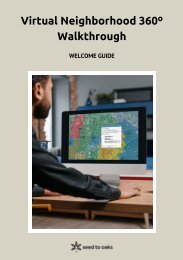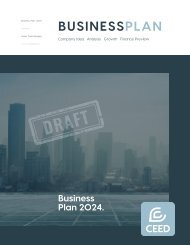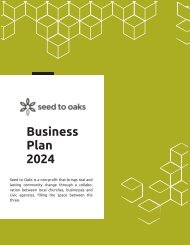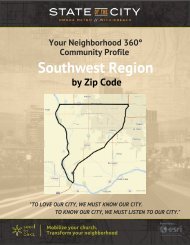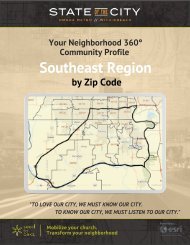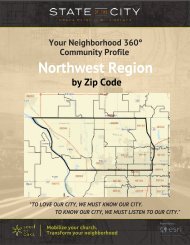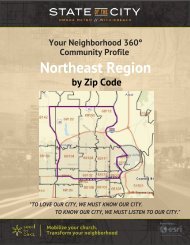Job One Training Manual
You also want an ePaper? Increase the reach of your titles
YUMPU automatically turns print PDFs into web optimized ePapers that Google loves.
JOB ONE KENTUCKY<br />
SEED TO OAKS<br />
JOB ONE<br />
KENTUCKY<br />
Success <strong>Training</strong> <strong>Manual</strong><br />
We are leading the way in economic<br />
opportunity by mobilizing local churches to the<br />
front lines of social change.<br />
www.seedtooaks.com<br />
1
2<br />
SEED TO OAKS
JOB ONE KENTUCKY<br />
For I know the plans<br />
I have for you,”<br />
declares the LORD,<br />
“plans to prosper<br />
you and not to harm<br />
you, plans to give<br />
you hope and a<br />
future.”<br />
— Jeremiah 29:11<br />
3
SEED TO OAKS<br />
Table of Contents<br />
1<br />
Defining Success<br />
Vision and Success<br />
Success Accomplished through Work<br />
Page 06<br />
Page 10<br />
2<br />
Presenting Yourself for Success<br />
The Resume<br />
The Interview<br />
Page 16<br />
Page 21<br />
3<br />
Practicing for Success<br />
The Mock Interview<br />
Page 25<br />
4<br />
Success is More than Work Excellence<br />
Personal Character<br />
Your Past Influences the Future<br />
Page 30<br />
Page 34<br />
5 Apply for Success<br />
The <strong>Job</strong> Application and Next Steps<br />
Page 36<br />
6<br />
Additional Resources<br />
Networking<br />
Workplace Culture<br />
Page 38<br />
Page 40<br />
4
JOB ONE KENTUCKY<br />
Welcome!<br />
About <strong>Job</strong> <strong>One</strong>’s Success <strong>Training</strong><br />
This training course is designed to provide you with guidance that will sharpen skills you<br />
already have and help you develop new skills that will secure you the best job, with the<br />
highest pay possible. We are on this journey with you to:<br />
§ Help you to define personal success<br />
§ Help you to learn and excel at the game of life<br />
§ Prepare you to market yourself for success<br />
§ Place you into employment, with opportunity for pay raises<br />
§ Train you on keeping your job for long-term increased pay<br />
§ Focus on character (handling anger, tiredness, frustration…)<br />
What to Expect<br />
§ Expect breakthroughs.<br />
§ Expect an experience that has been proven over time. This training process has<br />
been tested and offers you a proven opportunity to find a job. Take full advantage<br />
of it.<br />
§ Expect God to show up. God tells us that we have all we need for life and<br />
godliness. God will provide for you in ways you never expected or imagined.<br />
Our Commitment to You<br />
It is our desire that all of these objectives are accomplished. Due to God’s grace, we are<br />
committed to introduce you to employers who are looking to hire – from all over the city of<br />
Louisville – and who are rooting for your success. They are excited to offer you an<br />
opportunity, not a guarantee, to succeed in your own personal dreams and endeavors.<br />
YOU, however, are the primary person responsible for your success throughout this<br />
training. We are thrilled to see what you will make of such an opportunity!<br />
5
SEED TO OAKS<br />
01<br />
Defining Personal<br />
Success<br />
Commit your way to the LORD, and then your<br />
plans will succeed. – Proverbs 16:3<br />
6
JOB ONE KENTUCKY<br />
What is vision?<br />
Vision is a picture of what<br />
could be, with the<br />
conviction that it must be.<br />
How Vision Shapes Your Life<br />
Let’s begin by getting on the same page mentally.<br />
Just as in boxing, where the head goes the body<br />
follows. In the same way, where the imagination<br />
goes on any given issue, your life tends to follow.<br />
Vision is a picture of what could be, with the<br />
conviction that it must be. In other words, how you<br />
envision your future life will shape how you live<br />
today. Clear vision is so important that the bible<br />
says, “where there is no vision, the people parish<br />
(Proverbs 29:18).”<br />
Success = Making Your Vision a Reality<br />
It is also critical to have a clear definition of success.<br />
Success is defined as accomplishing an aim or<br />
purpose. We don't want to be dreamers only. We<br />
want to succeed at making our vision for a good life<br />
a reality.<br />
Being successful is harder than it sounds. It requires<br />
work, discipline, trusting relationships and most<br />
importantly character. Character refers to your<br />
mental strength or grit and your moral maturity.<br />
If you are like most of us, we grow up never quite<br />
knowing how to be successful at life. Even if we have<br />
vision, we don’t know how to succeed at making it a<br />
reality. For some of us, we lack both vision and<br />
direction. Nothing to move towards. We settle for<br />
lives where we simply exist and move about. God,<br />
however, wants and has more for us, much much<br />
more.<br />
Because we serve a big God, God has a big vision for<br />
our lives. There are several areas of life where we<br />
need a proper vision of success. What might some of<br />
those different areas look like?<br />
For example:<br />
A Theological Vision may look like this:<br />
“The Chief end of man is to glorify God and enjoy<br />
Him forever (Westminster Confession).”<br />
7
SEED TO OAKS<br />
Trust in the Lord with all your heart and lean not on<br />
your own understanding. In all your ways<br />
acknowledge him and he will make your paths<br />
straight.<br />
Proverbs 3:5-6<br />
Think on whatever is true, whatever is honorable,<br />
whatever is right, whatever is pure, whatever is lovely,<br />
whatever is good, if there is any excellence and<br />
anything worthy of praise, dwell on these things.<br />
Philippians 4:7<br />
Delight yourself in the Lord and he will give you the<br />
desires of your heart. Commit your way to the Lord<br />
and he will do it.<br />
Psalm 37:4-5<br />
An Educational Vision may sound like:<br />
“I want to attain my High School equivalency with an<br />
undergraduate degree.”<br />
Your vision for life and definition of what success<br />
looks like for you should give shape to every choice<br />
that you make. Either the choices you make are<br />
moving you closer to success or moving you further<br />
from it.<br />
Mapping My Success<br />
PART ONE: My Definition of<br />
Personal Success<br />
This is the first part of two exercises in this session<br />
that will help you bring clarity to what success<br />
personally means to you.<br />
Step 1: Assess what is important. Rate each of these<br />
life priorities on a scale of 1-10 in terms of how<br />
satisfied you are in each of these areas.<br />
Next, number each of these things from one 1-10 in<br />
order of what you believe is most important for you<br />
to focus on this next year.<br />
8
JOB ONE KENTUCKY<br />
1. Write words that you want to associate with your life that means success to you (peaceful, well-off,<br />
secure, etc.).<br />
Life Area How am I doing? Priority?<br />
Relationship with God<br />
Finances<br />
Family<br />
Self-Development<br />
Marriage<br />
Health<br />
Recreation/Hobbies<br />
Children<br />
Friendships<br />
<strong>Job</strong>/Career<br />
Other<br />
Step 2: Write words that you want to associate with your life that<br />
means success to you (peaceful, well-off, secure, etc.).<br />
God never said<br />
that the journey<br />
would be easy, but<br />
He did say that the<br />
arrival would be<br />
worthwhile.”<br />
— Max Lucado<br />
Step 3: Write a one sentence definition of success using the words<br />
and priorities above.<br />
9
SEED TO OAKS<br />
Accomplishing Success through Work<br />
There are many ways you can accomplish your goals. Faith, work,<br />
family, relationships, and money are all needed to succeed. Let’s look<br />
at accomplishing success through work.<br />
Work is not punishment OR a necessary evil, OR a means of getting<br />
control, power and wealth. ALL of these ideas are contrary to the<br />
biblical view of work. The bible says God created work as something<br />
very good. Through hard work, we are co-creators in God’s world and<br />
work is part of our contribution to each other and to God.<br />
Work is unique to humanity. In a sense, it constitutes our very<br />
nature. In other words, work itself is part of who we are as humans and<br />
a primary means of life in God’s world.<br />
The Lord God took the man and<br />
put him in the Garden of Eden to<br />
work it and take care of it.<br />
Genesis 3:15<br />
Whatever you do, work at it with<br />
all your heart as working for the<br />
Lord, not for men.<br />
Colossians 3:23<br />
Idle hands are the Devil’s workshop.<br />
Proverbs 16:27<br />
Work hard…do the will of God<br />
with all your heart. Work with<br />
enthusiasm, as though you were<br />
working for the Lord rather than<br />
for men.<br />
Ephesians 6:6<br />
And also that every man should<br />
eat and drink and enjoy the good<br />
of all his labor, it is the gift of<br />
God.<br />
Ecclesiastes 3:13<br />
5 Key Principals of Work<br />
1. Only We Can Do It-Working Is essential to the nature and design of<br />
humans. Work is a supreme dignifying activity because with it comes<br />
purpose and clarity of self-ability. To not work is to create voids within<br />
our personhood that often leads to low feelings of worth; depression;<br />
and too often leads to idle hands and time.<br />
2. Without It We’re Idle- Proverbs 16:27 tells us “Idle hands are the Devil’s<br />
workshop.” King Solomon’s point here is that hands that are empty of<br />
the hammer and nail for the sake of production are hands available<br />
inevitably for mischief and destruction.<br />
3. It’s How We Benefit The World-Mankind (you) participates with God In<br />
taking care of the world by working, cultivating, problem solving,<br />
producing and harvesting. Without mowing the lawn, uprooting the<br />
weeds, protecting the endangered, etc., the world would be in<br />
shambles.<br />
4. It Uniquely Fulfills- There is a fulfillment that only comes through the<br />
stuff of planning, sweating, producing and accomplishing. Whether at a<br />
coal factory or a national cooperation the stuff of work provides unique<br />
pleasure necessary for human flourishing.<br />
5. Working Helps To Accomplish Dreams – Simply put, working brings<br />
about a steady and predictable resource that allows humans to build<br />
deeper foundations for larger and more successful futures.<br />
10
JOB ONE KENTUCKY<br />
America’s Model for Economic<br />
Success<br />
But as for you, be strong do not give up,<br />
for your work will be rewarded.<br />
2 Chronicles 15:7<br />
Every establishment has rules that govern their particular<br />
philosophies of life and culture to an expected end of success.<br />
Reviewing the model above from left to right, notice America’s<br />
philosophy of success under capitalism:<br />
§ Someone has an idea to start a company. After that idea has<br />
been processed and defined through a business plan, the plan<br />
is pitched to banks and investors for funds to start the<br />
company.<br />
§ If approved, the funds for the idea are invested in hiring people<br />
to work in different capacities at offices and<br />
warehouses/factories for mass production and shipping for the<br />
marketplace as individuals are purchasing the product of the<br />
business starter.<br />
§ Finally, as people are hired to produce products, and consumers<br />
purchase those products, profit is generated for the company,<br />
as well as pay checks for the employee, monies for local cities<br />
that receive tax revenue from goods sold in their municipality<br />
and most of all, a happy customer which the entire system rests.<br />
The man who plants, and the one who<br />
waters has one purpose, each will be<br />
rewarded according to his own labor.<br />
For we are God’s fellow workers; you are<br />
God’s field, God’s building.<br />
1 Corinthians 3:8-9<br />
He must labor, performing with his own<br />
hands what is good, so that he will have<br />
something to share with the one who<br />
has need.<br />
Ephesians 4:28<br />
May the favor of the Lord our God rest<br />
upon us; establish the works of our<br />
hands for us – yes, establish the works<br />
of our hands.<br />
Psalm 90:7<br />
Now that we’ve discussed how to play<br />
the game, are you healthy enough to<br />
play? In our next section we’ll discuss<br />
discuss the health of your self-sufficiency.<br />
11
SEED TO OAKS<br />
Mapping My Success<br />
PART TWO: How Self-Sufficient am I?<br />
<strong>One</strong> of the biggest hindrances to success in the workplace are the weaknesses that we bring into the<br />
workplace. Knowing yourself and where you are vulnerable is important to succeed. Only when we are<br />
honest about where we are, can we truly address our weaknesses and build on our strengths.<br />
Take time to work through the following assessment. It will help you determine how self-sufficient you<br />
currently are. Score yourself in each life area and select 3 areas you want to focus on this next year.<br />
After this exercise, you may want to change or update your definition of success on the previous page.<br />
Area of Life 1 2 3 4 5 Score?<br />
Housing<br />
Employment<br />
Income<br />
Food<br />
Child Care<br />
Children's<br />
Education<br />
Adult<br />
Education<br />
Homeless or<br />
threatened with<br />
eviction.<br />
No job.<br />
No income.<br />
No food or means to<br />
prepare it. Relies to a<br />
significant degree on<br />
other sources of free<br />
or low-cost food.<br />
Needs childcare, but<br />
none is available/<br />
accessible/ and/or<br />
child is not eligible.<br />
<strong>One</strong> or more schoolaged<br />
children not<br />
enrolled in school.<br />
Literacy problems<br />
and/or no high<br />
school diploma/GED<br />
are serious barriers<br />
to employment.<br />
In transitional, temporary<br />
or substandard housing;<br />
and/or current<br />
rent/mortgage payment is<br />
unaffordable (over 30% of<br />
income).<br />
Temporary, part-time or<br />
seasonal; inadequate pay,<br />
no benefits<br />
Inadequate income and/or<br />
spontaneous or<br />
inappropriate spending.<br />
Household is on food<br />
stamps.<br />
Childcare is unreliable or<br />
unaffordable, inadequate<br />
supervision is a problem<br />
for childcare that is<br />
available.<br />
<strong>One</strong> or more school-aged<br />
children enrolled in school,<br />
but not attending classes.<br />
Enrolled in literacy and/or<br />
GED program and/or has<br />
sufficient command of<br />
English to where language<br />
is not a barrier to<br />
employment.<br />
In stable housing that<br />
is safe but only<br />
marginally adequate.<br />
Employed full time;<br />
few or no benefits.<br />
Can meet basic needs<br />
with subsidy;<br />
appropriate spending.<br />
Can meet basic food<br />
needs, but requires<br />
occasional assistance.<br />
Affordable subsidized<br />
childcare is available,<br />
but limited.<br />
Enrolled in school,<br />
but one or more<br />
children only<br />
occasional attending<br />
classes.<br />
Has high school<br />
diploma/GED.<br />
Household is in<br />
safe, adequate<br />
subsidized housing.<br />
Employed full time<br />
with adequate pay<br />
and benefits.<br />
Can meet basic<br />
needs and manage<br />
debt without<br />
assistance.<br />
Can meet basic food<br />
needs without<br />
assistance.<br />
Reliable, affordable<br />
childcare is<br />
available, no need<br />
for subsidies.<br />
Enrolled in school<br />
and attending<br />
classes most of the<br />
time.<br />
Needs additional<br />
education/ training<br />
to improve<br />
employment<br />
situation and/or to<br />
resolve literacy<br />
problems to where<br />
they are able to<br />
function effectively<br />
in society.<br />
Household is safe,<br />
adequate,<br />
unsubsidized<br />
housing.<br />
Maintains<br />
permanent<br />
employment with<br />
adequate income<br />
and benefits.<br />
Income is sufficient,<br />
well managed; has<br />
discretionary<br />
income and is able<br />
to save.<br />
Can choose to<br />
purchase any food<br />
household desires.<br />
Able to select<br />
quality childcare of<br />
choice.<br />
All school-aged<br />
children enrolled<br />
and attending on a<br />
regular basis.<br />
Has completed<br />
education/ training<br />
needed to become<br />
employable. No<br />
literacy problems.<br />
Participant<br />
Goal?<br />
12
JOB ONE KENTUCKY<br />
Area of Life 1 2 3 4 5 Score?<br />
Participant<br />
Goal?<br />
Health Care<br />
Life Skills<br />
Family/Social<br />
Relations<br />
Mobility<br />
Community<br />
Involvement<br />
Parenting<br />
Skills<br />
Legal<br />
Mental Health<br />
Substance<br />
Abuse<br />
Safety<br />
Disabilities<br />
No medical coverage<br />
with immediate<br />
need.<br />
Unable to meet basic<br />
needs such as<br />
hygiene, food,<br />
activities of daily<br />
living.<br />
Lack of necessary<br />
support from family<br />
and friends; abuse<br />
(DV, child) is present<br />
or there is child<br />
neglect.<br />
No access to<br />
transportation,<br />
public or private;<br />
may have car that is<br />
inoperable.<br />
Not applicable due<br />
to crisis situation; in<br />
"survival" mode.<br />
There are safety<br />
concerns regarding<br />
parenting skills.<br />
Current outstanding<br />
tickets or warrants.<br />
Danger to self or<br />
others; recurring<br />
suicidal ideation;<br />
experiencing severe<br />
difficulty in day-today<br />
life due to<br />
psychological<br />
problems.<br />
Meets criteria for<br />
severe abuse/<br />
dependence;<br />
resulting problems<br />
so severe that<br />
institutional living or<br />
hospitalization may<br />
be necessary.<br />
Home or residence is<br />
not safe; immediate<br />
level of lethality is<br />
extremely high;<br />
possible CPS<br />
involvement.<br />
In crisis - acute or<br />
chronic symptoms<br />
affecting housing,<br />
employment, social<br />
interactions, etc.<br />
No medical coverage and<br />
great difficulty accessing<br />
medical care when needed.<br />
Some household members<br />
may be in poor health.<br />
Can meet a few but not all<br />
needs of daily living<br />
without assistance.<br />
Family/friends may be<br />
supportive, but lack ability<br />
or resources to help; family<br />
members do not relate<br />
well with one another;<br />
potential for abuse or<br />
neglect.<br />
Transportation is available,<br />
but unreliable,<br />
unpredictable,<br />
unaffordable; may have car<br />
but no insurance, license,<br />
etc.<br />
Socially isolated and/or no<br />
social skills and/or lacks<br />
motivation to become<br />
involved.<br />
Parenting skills are<br />
minimal.<br />
Current charges/ trial<br />
pending, noncompliance<br />
with probation/ parole.<br />
Recurrent mental health<br />
symptoms that may affect<br />
behavior, but not a danger<br />
to self/other; persistent<br />
problems with functioning<br />
due to mental health<br />
symptoms.<br />
Meets criteria for<br />
dependence;<br />
preoccupation with use<br />
and/or obtaining<br />
drugs/alcohol; withdraw or<br />
withdrawal avoidance<br />
behaviors evident; use<br />
results in avoidance or<br />
neglect of essential life<br />
activities.<br />
Safety is threatened/<br />
temporary protection is<br />
available; level of lethality<br />
is high.<br />
Vulnerable - sometimes or<br />
periodically has acute or<br />
chronic symptoms<br />
affecting housing,<br />
employment, social<br />
interactions, etc.<br />
Some members (e.g.<br />
Children) have<br />
medical coverage.<br />
Can meet most but<br />
not all daily living<br />
needs without<br />
assistance.<br />
Some support from<br />
family/friends; family<br />
members<br />
acknowledge and<br />
seek to change<br />
negative behaviors;<br />
are learning to<br />
communicate and<br />
support.<br />
Transportation is<br />
available and<br />
reliable, but limited<br />
and/or inconvenient;<br />
drivers are licensed<br />
and minimally<br />
insured.<br />
Lacks knowledge of<br />
ways to become<br />
involved.<br />
Parenting skills are<br />
apparent but not<br />
adequate.<br />
Fully compliant with<br />
probation/ parole<br />
terms.<br />
Mild symptoms may<br />
be present but are<br />
transient; only<br />
moderate difficulty in<br />
functioning due to<br />
mental health<br />
problems.<br />
Use within lasts 6<br />
months; evidence of<br />
persistent or<br />
recurrent social,<br />
occupational,<br />
emotional or physical<br />
problems related to<br />
use (such as<br />
disruptive behavior or<br />
housing problems);<br />
problems have<br />
persisted for at least<br />
one month.<br />
Current level of safety<br />
is minimally<br />
adequate; ongoing<br />
safety planning is<br />
essential.<br />
Safe - rarely has<br />
acute or chronic<br />
symptoms affecting<br />
housing, employment,<br />
social interactions,<br />
etc.<br />
All members can get<br />
medical care when<br />
needed, but may<br />
strain budget.<br />
Able to meet all<br />
basic needs of daily<br />
living without<br />
assistance.<br />
Strong support from<br />
family or friends.<br />
Household members<br />
support each other's<br />
efforts.<br />
Transportation is<br />
generally accessible<br />
to meet basic travel<br />
needs<br />
Some community<br />
involvement<br />
(advisory group,<br />
support group), but<br />
has barriers such as<br />
transportation,<br />
childcare issues.<br />
Parenting skills are<br />
adequate.<br />
Has successfully<br />
completed<br />
probation/ parole<br />
within past 12<br />
months, no new<br />
charges filed.<br />
Minimal symptoms<br />
that are expectable<br />
responses to life<br />
stressors; only slight<br />
impairment in<br />
functioning.<br />
Used during last 6<br />
months, but no<br />
evidence of<br />
persistent or<br />
recurrent social,<br />
occupational,<br />
emotional, or<br />
physical problems<br />
related to use; no<br />
evidence of<br />
recurrent dangerous<br />
use.<br />
Environment is safe;<br />
however, future of<br />
such is uncertain;<br />
safety planning is<br />
important.<br />
Building Capacity -<br />
asymptomatic -<br />
condition controlled<br />
by services or<br />
medication.<br />
All members are<br />
covered by<br />
affordable,<br />
adequate health<br />
insurance.<br />
Able to provide<br />
beyond basic needs<br />
of daily living for<br />
self and family.<br />
Has healthy/<br />
expanding support<br />
network; household<br />
is stable and<br />
communication is<br />
consistently open.<br />
Transportation is<br />
readily available<br />
and affordable; car<br />
is adequately<br />
insured.<br />
Actively involved in<br />
the community.<br />
Parenting skills are<br />
well developed.<br />
No active criminal<br />
justice involvement<br />
in more than 12<br />
months and/or no<br />
felony criminal<br />
history.<br />
Symptoms are<br />
absent or rare; good<br />
or superior<br />
functioning in wide<br />
range of activities;<br />
no more than every<br />
day problems or<br />
concerns.<br />
No drug use/alcohol<br />
abuse in last 6<br />
months.<br />
Environment is<br />
apparently safe and<br />
stable.<br />
Thriving - no<br />
identified disability.<br />
13
SEED TO OAKS<br />
There are no secrets to success. It is the result of<br />
preparation, hard work and learning from failure.<br />
Personal Reflections/Notes<br />
Homework<br />
• Memorize your personal<br />
definition of success and be<br />
prepared to share it next<br />
class<br />
• Bring in current resume<br />
• Dress professionally as best<br />
you can<br />
14
JOB ONE KENTUCKY<br />
02<br />
Presenting Yourself<br />
for Success<br />
“The aim of art is to represent not the outward appearance of<br />
things, but their inward significance”<br />
-Aristotle<br />
15
l o n g , e s p e c i a l l y i f y o u g e t h i r e d f o r a j o b p o s i t i o n .<br />
p r o f e s s i o n a l e v e n t , t a k e o n e m i n u t e t o c e n t e r<br />
y o u r s e l f , s a y a p r a y e r , a n d g e t y o u r i n n e r w o r l d<br />
SEED TO OAKS<br />
A picture is worth a<br />
thousand words.<br />
You may only get one shot to show<br />
an employer who you are and what<br />
you are capable of. How you<br />
present yourself is of great<br />
importance. How much is your<br />
success worth to you?<br />
You better lose yourself in the music, the moment<br />
You own it, you better never let it go<br />
You only got one shot, do not lose your chance to blow<br />
This opportunity comes once in a lifetime…<br />
Eminem<br />
First Impressions<br />
The image of success is not universal. What communicates success in one context<br />
may not do so in another.<br />
We're built to size each other up quickly. Even if<br />
we're presented with lots of evidence to the<br />
contrary, we're attached to our initial impressions of<br />
people—which is why you should be aware of the<br />
impression you make on others. You can’t undo your<br />
first impression, but there are lots of ways you can<br />
plan to make a great first impression that is positive<br />
and memorable.<br />
When meeting someone for the first time, it is<br />
important to be yourself, but focus on showing your<br />
best self. You can’t keep up false impressions very<br />
Before entering the room for a job interview or<br />
Be mindful that your words are important but your<br />
non-verbal communication tends to speak volumes<br />
of truth. Pay attention to your posture, manner, eye<br />
contact, and other non-verbal communications and<br />
ask yourself what they are communicating about<br />
you.<br />
Ironically, leaving a good first impression is not all<br />
about you. Focus on the other as much as you can.<br />
Attend to the other person by asking questions and<br />
try to see the world through their eyes. Not only will<br />
you likely connect better but you'll find yourself<br />
freer to be your best self that is likely to be more<br />
thoughtful and compassionate too.<br />
organized.<br />
16
JOB ONE KENTUCKY<br />
from a fireman or soldier, a<br />
uniform is an identifying outfit<br />
worn by members of a given<br />
profession, organization or rank.<br />
To be employed is to learn what<br />
uniform should be worn (suit and<br />
tie, tucked in shirt with steeltoes,<br />
polo’s and khakis, etc.).<br />
The Two P’s of Presentation<br />
Paper Presentation<br />
Your Presentation Is Like The Shadow Of A<br />
Tree, More Often Than Not, It Precedes You.<br />
Presentation, Identity and Uniforms<br />
Image and presentation are very important to most people because it<br />
can represent who you are and make a statement of who you want to<br />
be. How you dress, or wear your hair; your style or your swag is closely<br />
associated with your identity.<br />
The discussion of professional appearance and presentation can ruffle<br />
many feathers because it may communicate that “your style” and thus<br />
“your identity” is not correct. Conformity, therefore is the potential<br />
threat.<br />
While this is understandable, there are two issues that need to be<br />
addressed. First, is our belief that internal realities are far more<br />
important than outward appearance, and when necessary, we all have<br />
to be able to hold style and/or appearance preferences with a loosegrip.<br />
Secondly, when applying for a job, included in that job is a workplace<br />
culture (which we will discuss further in another section) where some<br />
styles and appearances will be preferred over others. While there may<br />
be some conformity necessary to us all, doing life in the workplace is<br />
very much like putting on the proper uniform for a job. No different<br />
The Resume and application are<br />
the paper versions of you. It’s the<br />
first opportunity the employer<br />
has to evaluate whether you will<br />
be a good match for an open<br />
position. Resumes are based on<br />
your previous work experience,<br />
relevant accomplishments,<br />
accolades and educational<br />
attainment. Here you will want to<br />
put your best foot forward to<br />
assure that the paper version of<br />
you demonstrates a competent<br />
and impressive individual.<br />
In Person Presentation<br />
The in-person presentation,<br />
namely the Interview, is your<br />
second and typically final<br />
opportunity to convince the<br />
potential employer why they<br />
should hire you. It is pertinent<br />
that both your paper and inperson<br />
presentations align<br />
because the interview will be in<br />
conversation with your resume<br />
and application.<br />
17
SEED TO OAKS<br />
The Resume – a written summary<br />
of relevant job experience and<br />
education that comes before the<br />
interview.<br />
Two Different Styles<br />
Resumes can be used for several purposes, but most often are<br />
used to secure new employment. There are two accepted<br />
styles to present your qualifications to potential employers.<br />
Choose the one that best highlights your strengths.<br />
u<br />
Reverse Chronological Resume<br />
A reverse chronological resume lists a candidate's job<br />
experiences in chronological order, generally covering the<br />
previous 10 to 15 years. Positions are listed with starting and<br />
ending dates. Current positions on a resume typically list the<br />
starting date to the present.<br />
The reverse chronological resume works to build credibility<br />
through experience gained, while illustrating career growth<br />
over time and filling all gaps in a career trajectory.<br />
18
JOB ONE KENTUCKY<br />
The simpler you<br />
say it, the more<br />
eloquent it is.”<br />
— August Wilson<br />
Tip #1<br />
As a rule, you should only include the most recent 10-15<br />
years of your career history and only include experience<br />
relevant to the positions to which you are applying.<br />
A chronological resume is not recommended to job seekers with gaps in<br />
their career summaries.<br />
Functional Resume<br />
A functional resume lists work experience and skills sorted by skill area<br />
or job function. This type of resume is used to focus on skills that are<br />
specific to the type of position being sought. This format directly<br />
emphasizes specific professional capabilities and utilizes experience<br />
summaries as its primary means of communicating professional<br />
competency.<br />
A functional resume is a good method for highlighting particular skills<br />
or experiences, especially when those particular skills or experiences<br />
may have derived from a role which was held some time ago. Rather<br />
than focus on the length of time that has passed, the functional resume<br />
allows the reader to identify those skills quickly.<br />
Resume Evaluation<br />
There is great benefit in having your resume evaluated by a<br />
professional who will give constructive feedback on the content and<br />
presentation of your resume. You are then free to accept and make the<br />
suggested changes that will strengthen your resume and increase the<br />
chances of securing a job interview.<br />
Emphasize your strengths and<br />
accomplishments on your resume,<br />
in your cover letters and in your<br />
interviews.<br />
Tip #2<br />
Convey your passion and link your<br />
strengths to measurable results.<br />
Employers and Interviewers love<br />
concrete data.<br />
Tip #3<br />
Cater and/or adapt your resume for<br />
the industry or job you are applying<br />
for.<br />
Tip #4<br />
Networking is key to success.<br />
Handing out resumes to potential<br />
employers, friends who are in<br />
management positions, and to<br />
influential people you know should<br />
be a full-time job.<br />
Tip #5<br />
You don’t need to include your<br />
address anymore, but you need to<br />
include a reliable phone number,<br />
professional email address, as well<br />
as other ways employers can find<br />
you on the internet or social media..<br />
Tip #6<br />
Get help from a professional or<br />
friend. This is the most important<br />
document in getting a job, so ask for<br />
and receive help!<br />
19
20<br />
SEED TO OAKS
JOB ONE KENTUCKY<br />
The Interview - a formal<br />
meeting in which one or<br />
more persons, question,<br />
consult, or evaluate<br />
another person to find<br />
out if they are suitable for<br />
a job.<br />
Preparing for the Interview<br />
Essentially, your interviewers are buyers and you<br />
are salespersons. What are you selling? You are<br />
selling the most valuable commodity in the world;<br />
when interviewing for a job, the most valuable asset<br />
in the world is not, oil, rare jewels or gold; it’s you.<br />
The question is, is what you’re selling worth buying?<br />
Are you qualified to do the job that needs to be<br />
done? And if so, can you convince an employer of<br />
such? If you’re not qualified for the position, if you<br />
make a good impression on the employer, you<br />
increase your chances they will keep you in mind for<br />
another position.<br />
As a matter of fact, we interview all the time. Can<br />
you think of times when you interview people?<br />
Be strong and take heart, all you who hope in the Lord.<br />
Psalm 31:24<br />
Be joyful in hope, patient in affliction, faithful in<br />
prayer.<br />
Romans 12:12<br />
Have I not commanded you? Be strong and<br />
courageous. Do not be terrified; do not be<br />
discouraged, for the Lord your God will be with you<br />
wherever you go.<br />
Joshua 1:9<br />
Get a Good Night’s Sleep<br />
§ You don’t want to look tired, sleepy or sickly.<br />
§ Take a shower to look sharp and alert.<br />
§ Shampoo your hair to make a huge statement<br />
about personal hygiene and cleanliness.<br />
Brush your Teeth<br />
§ You want employers to remember your ideas,<br />
personality and skills; not your breakfast!<br />
§ Use deodorant, but do not over do on the smell<br />
good. Example: your perfume or cologne could<br />
remind the employer of an ex husband or wife or<br />
someone they don’t like.<br />
Trim your Nails<br />
§ For guys, long and dirty nails are a turn off.<br />
Employers will notice when they shake your<br />
hand.<br />
§ For ladies, employers might think long colorful<br />
nails are unprofessional.<br />
Hair Styles<br />
§ For guys, lean and trimmed is best.<br />
§ For ladies, less is better.<br />
Men’s Attire<br />
§ Suit (solid color - navy or dark grey)<br />
§ Long sleeve shirt (white or coordinated with the<br />
suit)<br />
§ Belt<br />
§ Tie<br />
§ Dark socks, conservative leather shoes<br />
§ Little or no jewelry<br />
§ Neat, professional hairstyle<br />
§ Limit the aftershave<br />
Women’s Attire<br />
§ Suit (navy, black or dark grey)<br />
§ The suit skirt should be long enough so you can<br />
sit down comfortably<br />
21
SEED TO OAKS<br />
Answering the felony<br />
question.<br />
Give a very brief explanation of the crime including<br />
only the necessary information and leaving out<br />
personal details and drama. The older the better so<br />
mention if it was a long time ago.<br />
Take responsibility for your actions. Admit you<br />
made some poor choices. Give the interviewer a<br />
brief explanation of your crime. Do no make excuses<br />
or try to justify the crime.<br />
Put a positive spin on your experience. Tell the<br />
employer what your experience taught you – ex., you<br />
gained quick social skills, respected authority, took<br />
direction, tapped into your creativity or set goals.<br />
§ Coordinated blouse<br />
§ Conservative shoes<br />
§ Limited jewelry (no dangling earrings or arms<br />
full of bracelets)<br />
§ No jewelry is better than cheap jewelry<br />
§ Professional hairstyle<br />
§ Neutral pantyhose<br />
§ Light make-up and perfume<br />
§ Neatly manicured clean nails<br />
Before the Interview<br />
§ Get your interview clothes ready the night<br />
before<br />
§ Practice your interview the day before<br />
§ Confident in responses<br />
§ Arrive 30 mins before<br />
The Role of Prayer<br />
Prayer does not guarantee a job outcome, but does<br />
show dependence on God, who controls all things and<br />
can make anything happen.<br />
§ Directions: know exactly where you are going!!!<br />
Do’s<br />
§ Bring identification<br />
§ Bring and use a note pad and pen<br />
§ Mention names of mutual contacts and people<br />
you and your interviewer both know<br />
§ Bring extra copies of your resume<br />
§ Be prepared with a reference list<br />
§ Bring a work sample if relevant to job<br />
Don’ts<br />
§ Gum or candy<br />
§ Coffee, soda or water<br />
§ Phone/ IPod<br />
§ A hat or cap<br />
§ Too many rings - if you have lots of piercings<br />
leave some of your rings at home (one pair of<br />
earrings is a good rule)<br />
§ Cover tattoos<br />
§ Your parent(s), friends or anyone else<br />
22
JOB ONE KENTUCKY<br />
Stress that you have turned your life around. Since<br />
your conviction, you probably have made changes in<br />
your life so you don’t ever go back to prison. Talk<br />
about these changes. Ex., joining AA, a support group,<br />
seeking counseling, leaving an abusive relationship, or<br />
reconnecting with family.<br />
An example: “Seven years ago, I was convicted of<br />
possessing a controlled substance. I served my time<br />
and am now on parole. I took part in an addiction<br />
program and am now drug free. Since my conviction, I<br />
have earned my GED and have gotten my beauty<br />
license. I have reconnected with my family and am<br />
living with my parents. They are incredibly loving and<br />
supportive. My conviction was a mistake I made, but I<br />
have turned my life around. It won’t happen again.”<br />
Interview Tip #1<br />
Practice your responses to the typical job interview questions<br />
and answers most employers ask. Think of concrete examples<br />
you can use to highlight your skills. The easiest way to do this<br />
is make a list of the job requirements, and match them to your<br />
experience.<br />
Tip #2<br />
Don’t wait for the last minute to pick out an interview outfit,<br />
print extra copies of your resume, and find a notepad or pen.<br />
Have one good outfit ready, so you can interview on short<br />
notice without worrying what you will wear.<br />
Tip #3<br />
Be on time for the interview. On time means 5-10 minutes early.<br />
If need be, take some time to drive to the interview location<br />
ahead of time so you know exactly where you are going and<br />
how to get there.<br />
Tip #4<br />
Always follow up with a thank you note reminding them of your<br />
interest in the position. You can also include details you may<br />
have forgotten during your interview. Send your thank you<br />
note (email is fine) within 24 hours of your interview.<br />
23
SEED TO OAKS<br />
Homework:<br />
List of Accomplishments/Achievements:<br />
Resume Builder -<br />
Reverse Chronological<br />
Style<br />
<strong>Job</strong> Two<br />
Company:<br />
Title:<br />
Start Date:<br />
Description of Role:<br />
End Date:<br />
Personal Data<br />
Phone:<br />
Email:<br />
Website:<br />
List of Accomplishments/Achievements:<br />
Social Media<br />
LinkedIn<br />
Key Skills (Circle 3-5 or use your own)<br />
Efficiency | Honesty/Integrity | Organization<br />
Aggressiveness | Follow-through | Intelligence<br />
Analytical skills | Detail-Oriented | Persistence<br />
Proactivity | Flexibility/Adaptability | Enthusiasm<br />
Calm under pressure | Strategic thinking | Vision<br />
Creativity | Innovation | Work ethic | Listening<br />
High Standards | Openness to criticism and ideas<br />
Communication | Teamwork | Persuasion<br />
Technical | Salesmanship | Interpersonal<br />
Education<br />
School <strong>One</strong><br />
Name:<br />
Dates Enrolled:<br />
Degree:<br />
School Two<br />
Name:<br />
Dates Enrolled:<br />
Degree:<br />
Additional Activities<br />
Work Experience<br />
<strong>Job</strong> <strong>One</strong><br />
Company:<br />
Title:<br />
Start Date:<br />
Description of Role:<br />
End Date:<br />
Software<br />
MS Excel | MS Word | MS PowerPoint | Others<br />
Summary Statement (on the resume’ this goes<br />
first)<br />
I am a…<br />
24
JOB ONE KENTUCKY<br />
Homework:<br />
Resume Builder -<br />
Functional Style<br />
Relevant Skills<br />
Skill <strong>One</strong>:<br />
Description of accomplishments using skill:<br />
Skill Two:<br />
Description of accomplishments using skill:<br />
Personal Data<br />
Phone:<br />
Email:<br />
Website:<br />
Skill Three:<br />
Description of accomplishments using skill:<br />
Social Media<br />
LinkedIn<br />
Key Skills (Select 3-5 or use your own)<br />
Efficiency | Honesty/Integrity | Organization<br />
Aggressiveness | Follow-through | Intelligence<br />
Analytical skills | Detail-Oriented | Persistence<br />
Proactivity | Flexibility/Adaptability | Enthusiasm<br />
Calm under pressure | Strategic thinking | Vision<br />
Creativity | Innovation | Work ethic | Listening<br />
High Standards | Openness to criticism and ideas<br />
Communication | Teamwork | Persuasion<br />
Technical | Salesmanship | Interpersonal<br />
Qualifications Summary<br />
Highlight top 3-5 life/work accomplishments:<br />
Work History<br />
<strong>Job</strong> <strong>One</strong><br />
Employer:<br />
City, Location:<br />
<strong>Job</strong> Title:<br />
<strong>Job</strong> Two<br />
Employer:<br />
City, Location:<br />
<strong>Job</strong> Title:<br />
Education<br />
School <strong>One</strong><br />
Name:<br />
Dates Enrolled:<br />
Degree:<br />
School Two<br />
Name:<br />
Dates Enrolled:<br />
Degree:<br />
Software<br />
MS Excel | MS Word | MS PowerPoint | Others<br />
25
SEED TO OAKS<br />
The Top Forty Interview<br />
Questions<br />
Homework: Have concrete examples<br />
for questions.<br />
Create professional email: first name<br />
or initials-dot-last name @<br />
gmail.com<br />
1. Are you the best person for this job? Why?<br />
2. Are you overqualified for this job?<br />
3. Describe a difficult experience at work and how<br />
you handled it.<br />
4. Describe yourself.<br />
5. Describe your best boss and your worst boss.<br />
6. Describe your career goals.<br />
7. Describe your work style.<br />
8. Do you prefer to work alone or on a team?<br />
9. Do you take work home with you?<br />
10. Give some examples of teamwork.<br />
11. Tell me of a time when you had difficulty<br />
working with a manager?<br />
12. Have you gotten angry at work? What<br />
happened?<br />
13. How do you handle pressure?<br />
14. How do you measure success?<br />
15. How long do you expect to work for this<br />
company?<br />
16. How much do you expect to get paid?<br />
17. How would you describe the pace at which<br />
you work?<br />
18. How would you describe yourself?<br />
19. How would you handle it if your boss was<br />
wrong?<br />
20. If the people who know you were asked why<br />
you should be hired, what would they say?<br />
21. Is there a type of work environment you prefer?<br />
22. Is there anything else I can tell you about the job<br />
and the company?<br />
23. Tell me why you want to work here.<br />
24. What are you looking for in your next position?<br />
25. What are you passionate about?<br />
26. What are your goals for the future?<br />
27. What are your salary requirements?<br />
28. What can you do for this company?<br />
29. What can you contribute to this company?<br />
30. What challenges are you looking for in your next<br />
job?<br />
31. What did you like or dislike about your previous<br />
job?<br />
32. What do you expect from a supervisor?<br />
33. What do you find are the most difficult decisions<br />
to make?<br />
34. What have you learned from your mistakes?<br />
35. What interests you about this job?<br />
36. What is your greatest strength?<br />
37. What is your greatest weakness?<br />
38. What major challenges have you handled?<br />
39. What problems have you encountered at work?<br />
40. What was your biggest accomplishment (failure) in<br />
this position?<br />
26
JOB ONE KENTUCKY<br />
03<br />
Practicing for<br />
Success<br />
Without good direction, people lose their way. The more wise<br />
council you follow, the better your chances” - Proverbs 11:14<br />
27
SEED TO OAKS<br />
The Mock Interview<br />
A practice interview with a<br />
professional to give you<br />
constructive feedback on<br />
your performance.<br />
Preparation<br />
§ Prepare for the session by researching your<br />
company/job position/industry of interest.<br />
§ Investigate and identify the most common<br />
industry traits sought (analytical skills,<br />
communication skills, business knowledge and<br />
problem solving).<br />
§ Script answers to demonstrate your experience<br />
with these factors as well as answers to the<br />
behavioral questions in the top 40 interview<br />
questions (“tell me a time when…” and “Can you<br />
give me an example of a time when...”).<br />
The Session<br />
§ Dress in appropriate attire -- as though this is an<br />
actual company interview.<br />
§ Greet the interviewer with an<br />
enthusiastic handshake and smile.<br />
§ Listen to the question asked. Make sure you<br />
know what the interviewer wants to know. Ask<br />
for clarification if the question is not clear.<br />
§ Keep your answers concise and to the point --<br />
two to three minutes long.<br />
§ Make sure you are selling the product: You.<br />
§ Have questions prepared to ask the interviewer.<br />
The Feedback<br />
§ Observe your feelings during the interview and as<br />
you are hearing feedback.<br />
§ Did you coming across the way you intended?<br />
§ Listen to feedback with an open mind, not<br />
defensively.<br />
§ Learn from your performance.<br />
§ How are you being perceived through the eyes of<br />
someone who does not know you?<br />
28
JOB ONE KENTUCKY<br />
The quality of your answers and<br />
how well they match the job<br />
requirements<br />
The way you deliver your interview<br />
answers<br />
A mock interview helps reduce stress and<br />
anxiety about interviewing. It also boosts<br />
confidence and provides feedback in a low<br />
stress environment.”<br />
— James Westbrook<br />
Your confidence and poise under<br />
pressure<br />
Notes from interview feedback:<br />
Your Interview manners and attire<br />
The overall package<br />
Your level of preparedness<br />
29
`<br />
SEED TO OAKS<br />
04<br />
Success is more than<br />
Work Excellence<br />
As in water face reflects face, So the heart of man reflects man.<br />
Proverbs 27:19<br />
30
JOB ONE KENTUCKY<br />
Personal Character is A<br />
Significant KEY to Success!<br />
“Woe to you, scribes and Pharisees,<br />
hypocrites! For you clean the outside of the cup<br />
and the plate, but inside they are full of greed<br />
and self-indulgence. You blind Pharisee! First<br />
clean the inside of the cup and the plate, that<br />
the outside also may be clean.”<br />
- Matthew 23:25-26<br />
Your Story And Success<br />
You’re blessed when you’re at the<br />
end of your rope. With less of you<br />
there is more of God and his rule.<br />
Matthew 5:3 (MSG)<br />
You’re blessed when you’re<br />
content with just who you are –<br />
no more, no less. That’s the<br />
moment you find yourselves<br />
proud owners of everything that<br />
can’t be bought.<br />
Matthew 5:5 (MSG)<br />
You’re blessed when you get your<br />
inside world – your mind and<br />
heart – put right. Then you can<br />
see God in the outside world.<br />
Matthew 5:8 (MSG)<br />
You’re blessed when you can show<br />
people how to cooperate instead of<br />
compete or fight. That’s when you<br />
discover who you really are, and<br />
your place in God’s family<br />
Matthew 5:9 (MSG)<br />
When speaking with the religious establishment during the 1 st century,<br />
Jesus warned religious hypocrites of looking the part on the outside,<br />
however, being corrupt on the inside.<br />
Did you know that obtaining, maintaining and moving up the work<br />
ladder of success at your place of employment is not simply about what<br />
happens at the job but by what happens off the job as well?<br />
Our character is all the traits and features that we possess that reveal<br />
who we are. How do you respond when you’re angry? Are we honest?<br />
Do we steal? Do we take care of our family? While there are many<br />
reasons one loses their job – say, unfairness or job cuts – more often<br />
than not, how we answer the previous types of questions determine our<br />
ability or inability to maintain employment. Essentially, morally healthy<br />
persons healthily work.<br />
Our characters are shaped by the details of our life stories and<br />
particularly the good and bad habits we form from those details.<br />
The habits and behaviors we learned and didn’t learn—the good<br />
the bad, the ugly.<br />
Here we want to take some time and shortly discuss some of the<br />
events that shaped us as individuals. This session is going to<br />
require a small amount of trust and vulnerability with fellow<br />
students and table leaders.<br />
31
SEED TO OAKS<br />
Your Past<br />
Influences Your<br />
Future Success<br />
The blessings and hardships of<br />
our families have impact lasting<br />
our entire lives.<br />
Your Story<br />
We look at our families, not to find fault, but to get a<br />
realistic picture of what was healthy and unhealthy<br />
so we can grow, heal and mature as adults. This<br />
exercise will help you see generational patterns that<br />
impact your life.<br />
1. Write down 2-3 adjectives describing key<br />
members of your family (angry, joyful, sad,<br />
anxious, frustrated, born out of wedlock, griefridden,<br />
motivated, silly, envy, numb, mental<br />
illness).<br />
4. Describe the relationships with significant family<br />
members (ex., cut-off or no contact, conflict or<br />
issues don’t get resolved, enmeshment or lack of<br />
clear boundaries, abuse or severe crossing of<br />
personal boundaries, distant or unhealthy<br />
connection).<br />
5. What are the three most significant repeating<br />
patterns in your family history?<br />
2. Who in your family had the most “Power”?<br />
3. What role did you play in your family? (ex.,<br />
scapegoat, victim, fixer, favorite, problem solver,<br />
baby, screw-up, peacemaker, clown, loser).<br />
6. Are there any “earthquake” events in your family<br />
history? (ex., premature deaths, abuse, suicide,<br />
war, cancer, business collapse, affairs, etc.)<br />
32
JOB ONE KENTUCKY<br />
Evaluating Your Character<br />
This activity is geared to help us identify character flaws<br />
they can negatively affect successful employment.<br />
But as for you, be strong do not give up,<br />
for your work will be rewarded.<br />
2 Chronicles 15:7<br />
Characteristic Inadequate Adequate<br />
1. Overall Maturity—your overall maturity 1 2 3 4 5<br />
2. Above Reproach—Your overall reputation 1 2 3 4 5<br />
3. Marital Faithfulness—Your relationship with your spouse 1 2 3 4 5<br />
4. Temperate—The degree to which you level-headed and self-controlled in<br />
your daily living<br />
1 2 3 4 5<br />
5. Prudent—Your ability to be wise and discerning 1 2 3 4 5<br />
6. Respectable—Is your life worthy of respect 1 2 3 4 5<br />
7. Hospitable—Your kind and generous spirit 1 2 3 4 5<br />
8. Self Controlled—Your ability to control various obsessions and<br />
compulsions<br />
1 2 3 4 5<br />
9. Not Self-Willed—Your ability to relate to others without being selfcentered<br />
and controlling<br />
1 2 3 4 5<br />
10. Not Quick-Tempered—Your ability to control your anger 1 2 3 4 5<br />
11. Not Pugnacious—Your ability to control any form of verbal or physical<br />
abuse<br />
1 2 3 4 5<br />
12. Gentle—Your ability to be objective and fair-minded in your relationships 1 2 3 4 5<br />
13. Uncontentious—Your ability to avoid arguments 1 2 3 4 5<br />
14. Free from the Love of Money—Your ability to be non-materialistic 1 2 3 4 5<br />
15. <strong>One</strong> who manages his/her own household well—Your ability to function<br />
well in your family role<br />
1 2 3 4 5<br />
16. Loving what it good—Your ability to overcome evil with good 1 2 3 4 5<br />
17. Just—Your ability to be just and fair in your relationships with others 1 2 3 4 5<br />
18. Devout—The way your life reflects God’s holiness 1 2 3 4 5<br />
19. Disciplined—Your ability to live a disciplined life 1 2 3 4 5<br />
Reflections / Areas that I want to work on<br />
33
SEED TO OAKS<br />
05<br />
Applying for Success<br />
Without good direction, people lose their way. The more wise<br />
council you follow, the better your chances” - Proverbs 11:14<br />
34
JOB ONE KENTUCKY<br />
Be Ready to Give Information<br />
The <strong>Job</strong> Application - the<br />
very first step in applying<br />
for a job.<br />
The application may also require you to disclose<br />
any criminal record, and to provide information<br />
sufficient to enable the employer to conduct an<br />
appropriate background check.<br />
For a business that employs workers on a parttime<br />
basis, the application may inquire as to the<br />
specific times and days of your availability, and<br />
preferences in this regard.<br />
Be sure to do the following while filling out<br />
your application:<br />
1.<br />
2. When applying in person –<br />
Bring your completed Resume’ Builder from session<br />
The <strong>Job</strong> Application<br />
Two in this booklet to help fill out your application.<br />
Be sure to:<br />
From the employer's perspective, the application<br />
serves a number of purposes. At a minimum, an<br />
3.<br />
1. Dress professionally;<br />
application usually requires the applicant to provide 2. Smile;<br />
information sufficient to demonstrate that: 3. Ask for a manager;<br />
4. Firmly shake hands;<br />
§ The applicant is legally permitted to be employed. 5. State clearly that you would like to fill out an<br />
application, and<br />
§ The applicant can provide information regarding<br />
relevant skills, education, and experience (previous<br />
employment or volunteer work).<br />
6. State the position that you are applying for (you may<br />
have to call ahead for this information).<br />
§<br />
When applying on-line –<br />
It is a Test<br />
The application itself is a minor test of your basic<br />
literacy skills, penmanship, and communication<br />
skills. If you are careless, you might disqualify<br />
yourself with a poorly filled-out application.<br />
1. Follow up directly with step 5 above.<br />
2. Fill every portion of the application out.<br />
3. Be completely honest<br />
4. Know that it can take upwards to 4 weeks to<br />
complete a hiring process, but be sure to follow up<br />
in no later than 2 days to confirm that your<br />
application was in fact received.<br />
35
SEED TO OAKS<br />
James Westbrook<br />
<strong>Job</strong> <strong>One</strong> Program Director<br />
502-791-OAKS<br />
jwestbrook@seedtooaks.com<br />
We are here to help you in any way that we<br />
can!<br />
Next Steps<br />
After applying for your new position with a Seed To Oaks partner,<br />
expect the process to take upwards to 3 weeks (which includes<br />
application, interviews, background checks, etc.).<br />
John Fleming<br />
<strong>Job</strong> <strong>One</strong> Strategist<br />
jfleming@seedtooaks.com<br />
When a position is offered, upon your acceptance of the offer, you have<br />
officially entered into the 3 rd and 4 th phases of <strong>Job</strong> <strong>One</strong> <strong>Training</strong> (refer to<br />
Phase chronology below).<br />
• Phase <strong>One</strong>- Assessment & Strategy<br />
• Phase Two-Recruiting; <strong>Job</strong> <strong>Training</strong><br />
• Phase Three- <strong>Job</strong> Placement; Mentoring & Accountability<br />
• Phase Four- Retention<br />
Every trainee will be paired with both a workplace advocate as well as a<br />
community advocate (working as a mentor with a minimum<br />
commitment of 1 hour a week for a minimum of 3 months) for your<br />
successful professional and personal development.<br />
Our prayers are with and for you!<br />
Patrick Johnson<br />
<strong>Job</strong> <strong>One</strong> Retention Strategist<br />
pjohnson@seedtooaks.com<br />
36
JOB ONE KENTUCKY<br />
06<br />
Additional Resources<br />
Without good direction, people lose their way. The more wise<br />
council you follow, the better your chances” - Proverbs 11:14<br />
37
SEED TO OAKS<br />
Networking<br />
Networking is simply a<br />
strategy by which people get<br />
in touch and maintain<br />
contact with each other. It is<br />
one way to create a<br />
community that helps each<br />
other out.<br />
Knowing People is the Key to Success<br />
It's simple: knowing the right people can get you to<br />
places that you might not reach otherwise. Of all the<br />
areas where networking can help you, the most<br />
important are having relationships with key people<br />
who can help you out in ways you can't predict yet.<br />
Networking opens up new opportunities for you and<br />
your career. Ultimately, it's all about the relationships:<br />
the ones you can build through networking are<br />
invaluable. As some experts put it, "when times are<br />
tough, a client or ministry partner will leave you, but a<br />
friend won't."<br />
How to get started<br />
If you've never done it before, networking can be an<br />
intimidating endeavor. The only way to become a<br />
good networker is to "practice, practice, practice.”<br />
The more you do it, the better you get.<br />
Generally, there are 4 types of networking groups.<br />
§ Casual contact networks (friends, family, existing<br />
relationships)<br />
§ Knowledge networks (professional associations,<br />
schools, conferences).<br />
§ Strong contact networks (groups that meet<br />
frequently specifically to build professional<br />
relationships, like Young Professionals<br />
Louisville).<br />
§ Online networks (social media services, such as<br />
LinkedIn).<br />
Guidelines for Networking<br />
1. Be visible - You won't be able to network if<br />
you're not visible. If people don't know who you<br />
are, you can't start building those important<br />
relationships. Networking is a contact sport! You<br />
have to get out and connect with people.<br />
2. Build solid relationships - You have to cultivate<br />
real relationships with your contacts before you<br />
can ask them for a favor or expect them to send<br />
38
JOB ONE KENTUCKY<br />
you any help in return. It takes time for people<br />
to have confidence in you and have a<br />
relationship with you -- you have to invest in<br />
them.<br />
Try connecting with them on a level other than<br />
work. When you start to care about one another,<br />
you've developed a solid contact.<br />
3. Diversify - Having a diverse network is just as<br />
important as having a large network. Don’t let<br />
differences hinder you from getting to know<br />
people from different backgrounds. If you only<br />
know people who are like you your network<br />
becomes narrow and limited.<br />
4. Stay in touch - Your network will be useless if<br />
you don't maintain it -- that means constantly<br />
reaching out. Sending a thank-you note, making<br />
a phone call, arranging a meeting, sending an<br />
article of interest to someone, sharing someone<br />
else's insight... all of these count as networking,<br />
and you should be doing these as often as you<br />
can.<br />
5. Give back as much as you can - Successful<br />
networking is never about simply getting what<br />
you want. It's about getting what you want and<br />
making sure that people who are important to<br />
you get what they want, too. It's easy to drop off<br />
when you're not actively in need of something.<br />
But you need to remember that networking is a<br />
perpetual give-and-take. You want to be the<br />
one people go to when they need something.<br />
That means suggesting somebody else for a job<br />
when you can, putting them in touch with an<br />
acquaintance they should know... You have to<br />
give, give, give.<br />
6. Asking for help - Reaching out for help is often<br />
what makes people most uncomfortable. But<br />
the exchange shouldn't be awkward. If you've<br />
developed the relationship well, that help will<br />
come naturally. Some suggest asking what they<br />
need first, doing a favor for them unprompted,<br />
before you ask for one. Also, remember that<br />
people hate to say 'no.' If you put them in a<br />
position where they can say 'yes,' they'll be happy<br />
to do so. Most importantly, before asking for help,<br />
you should always remind yourself that you're<br />
focusing on building a relationship, not trying to<br />
get something out of them.<br />
7. Rekindle the relationship - If you've lost touch with<br />
a contact that you're wishing you could get in<br />
touch with now, you're not out of luck. While you<br />
should never just call them out of the blue and ask<br />
for a favor, you shouldn't feel awkward about<br />
getting in touch. Send an email, or call them, and<br />
say you want to rekindle the relationship.<br />
8. What if you're shy? - The thought of networking is<br />
most intimidating for people who are shy. Try to<br />
remember that you're really building relationships,<br />
not trying to get something out of someone.<br />
Consider planning three interesting talking points<br />
to bring with you to a conversation with a contact.<br />
Make them things that you'll be excited to talk<br />
about and you know will interest them, too. And, of<br />
course, practice will make you more comfortable,<br />
as well.<br />
9. Never, ever... The cardinal rule of networking:<br />
Never, ever ask for anything from someone you've<br />
just met, who you don't have any relationship with.<br />
Networking goes bad when a complete stranger<br />
says 'let's do business together, hook me up, etc.<br />
That's not networking, that's direct selling.<br />
Remember, networking isn't about passing out<br />
your business cards or asking people you don't<br />
know well for favors.<br />
10. Key takeaways - The key to successful networking<br />
is to remember that you're working on building<br />
real, deep relationships with your professional or<br />
ministry contacts. Your network won't do you any<br />
good if it's full of lots of people who you don't<br />
know very well; cultivating both the depth and<br />
width of your network is extremely important.<br />
Networking is not just about who you know -- it's<br />
about how well you know them."<br />
39
SEED TO OAKS<br />
Workplace Culture<br />
There are often unwritten<br />
and sometimes unfair<br />
rules in the workplace<br />
The Unwritten Rules of Company Culture<br />
Some rules pick up where the employee handbook<br />
leaves off. They are the real, but unwritten ways<br />
things actually get done in a given business. Be<br />
aware of them and succeed. Ignore them to your<br />
detriment. The only way to discern these rules is by<br />
observation. Here are some typical unwritten rules:<br />
Rule 1: When the Workday Begins and Ends<br />
If you came in early, it’s likely that no one saw you<br />
arrive. If you leave early, everybody knows it.<br />
Regardless of how productive your day was, if you<br />
regularly jet hours before the majority of your coworkers,<br />
you may get inaccurately labeled as lazy or<br />
lacking drive.<br />
Rule 2: Your boss’s open-door policy<br />
You may find a company that will tell you the boss’s<br />
door is always open! Come and share your best<br />
ideas! The reality may be quite different. It may turn<br />
out that your manager does not have time for you.<br />
Best to be informed before you invite yourself in to<br />
share your big ideas with the boss.<br />
Rule 3: When you are expected to respond to email<br />
Sometimes a boss will send detailed project emails<br />
late at night. It may not be necessary to interrupt<br />
your sleep schedule, but be sure to check emails every<br />
morning to see if you missed anything.<br />
Rule 4: How to dress<br />
Observe what your department is doing, and follow<br />
suit. Note whether your co-workers are dressed in<br />
jeans or business attire. Be sure notice how the team<br />
handles tattoos and piercings. Some organizations will<br />
be more open to these than others.<br />
Rule 5: When to take Vacation<br />
Every company defines the concept of work-life<br />
balance a bit differently. The stated vacation policy will<br />
tell you how much time you get to take off. The culture<br />
will tell you whether or not people actually pay<br />
attention to that policy.<br />
40
JOB ONE KENTUCKY<br />
Rule 6: Promotions are not always about who does the best job<br />
Politics and loyalty play a large role in the decision-making process.<br />
80% is performance, 20% is relationships and politics.<br />
Rule 7: Titles don’t necessarily indicate power<br />
Many people influence decisions, and sometimes politics trumps titles.<br />
Don't assume that someone's position means that person has power. To<br />
get ahead, be mindful of who really makes the decisions and who<br />
influences those decisions.<br />
God is just<br />
and gives<br />
us hope in<br />
the midst<br />
of<br />
unfairness<br />
and even<br />
setbacks.<br />
Rule 8: There can be a different set of rules for different people in<br />
different departments<br />
Your boss may have a different set of rules than someone with the<br />
same title in another department. You can't assume that everyone<br />
follows the same procedures.<br />
Rule 9: You can voice your opinion, but no one at the top may listen<br />
Figure out who actually listens and build relationships with the people<br />
who seek your input and can get things done.<br />
Rule 10: Most people are out for him or herself.<br />
Sometimes, the team exists on paper, but the reality is that the team<br />
doesn't function as a team.<br />
41
SEED TO OAKS<br />
Whatever your hand finds to do, do it with<br />
your might, for there is no work or<br />
thought or knowledge or wisdom in<br />
Sheol, to which we are going.”<br />
-Ecclesiastes 9:10<br />
42
JOB ONE KENTUCKY<br />
JOB ONE<br />
Resources cited and/or for further study:<br />
1 vision definition in faithmapping book<br />
2 How Self Sufficient am I? citation<br />
3 The Resume via Wikipedia<br />
4 Answering the Felony Question article<br />
5 Top 40 Interview questions<br />
6 Your Story Genogram by Pete Sczarro<br />
7 The <strong>Job</strong> Application via Wikipedia<br />
8 Networking articles<br />
9 Workplace Culture articles<br />
43
SEED TO OAKS<br />
SEED TO OAKS<br />
1302 S. Shelby Street<br />
Louisville, KY 40217<br />
502-791-OAKS<br />
info@seedtooaks.com<br />
www.seedtooaks.com<br />
44







